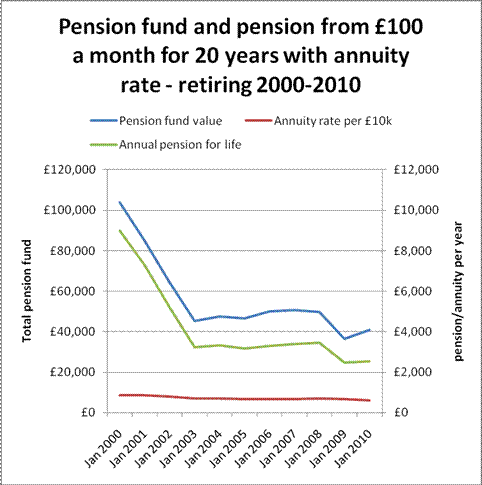
Wrong time to
retire
People retiring now could have 70% less pension than those
retiring a decade ago even if they paid in identical amounts. That is because
the pension they have been paying into will have grown more slowly. And that the
money in their fund will buy a lower pension for life than it would at the start
of the millennium.

The figures, provided by Investment Life & Pensions MoneyFacts, show that a man putting £100 a month into a pension for 20 years and retiring at 65 as the millennium began in January 2000 could expect to have a pension of nearly £9000 a year for life. His brother, ten years younger and retiring in January this year would have a pension for life of barely £2500 for exactly the same contributions.
James, born 1935, started paying into his pension in 1980 thus benefiting from the huge year on year stock market growth of the last quarter of the last century. So his £100 a month would have grown to £103,914 by January 2000. Brother Jonathan, born in 1945, gained from ten years reasonable growth from 1990 but then hit the stagnation of the last decade. So by January 2010 his £100 a month ended up as a fund of just £40,749 – 60% less than his brother’s.
In 2000 James got an annuity – a pension for life – of £866 for each £10,000 in his fund. So his pension was £8,998 a year. By the time Jonathan came to hang up his boots each £10,000 of fund bought a pension of just £624 a year, 28% less than his brother got. With his smaller fund he got a much smaller pension of just £2,542 a year – 72% less than his brother’s.
Married disharmony
The Revenue’s new computer system is having particular problems with married
couple’s allowance. To get this concession a couple has to be married (or in a
civil partnership) and at least one of them must have been born on 5 April 1935
or earlier – so at least 76 now. The full allowance is £6,965 and is given to
(a) the husband if entitlement began before 5 December 2005 or to the partner
with the higher income if entitlement began 5 December 2005 or later. Two things
can change the amount. First, if the entitled partner has an income of more than
about £29,000 a year the MCA can be reduced but it should never be lower than
£2,670. Secondly, a couple can share it in some circumstances so each gets a
part of it. Unlike other allowances, MCA is simply a deduction from the tax due
of 10% of the allowance. So the entitled partner normally gets £696.50 knocked
off their tax bill.
However, tax codes are not good at dealing with flat rate deductions and several readers have complained that their Married Couple’s Allowance has disappeared or been changed for 2010/11. If that has happened to you call the phone number on your Notice of Coding and make sure the right allowance has been given to you for 2010/11 – and that the correct amount was deducted in 2009/10. Any errors can be corrected for at least the past six years.
Pensions stay
frozen abroad
Half a million pensioners living overseas have lost their
final legal battle to get their pensions increased each year in line with
inflation. The Grand Chamber of the European Court of Human Rights ruled by 11
votes to 6 that freezing the state pensions paid to people in 150 overseas
countries was not a violation of their human rights.
Thirteen pensioners had argued that under the European Convention of Human Rights the UK government had to protect their property and was prohibited from discrimination. The state pension was property, paid for by National Insurance contributions. The state pension is increased each year with inflation when paid to UK pensioners living in fifty countries including the European Union. In the remaining 150 it is not. So the UK Government was discriminating against their enjoyment of their property according to where they chose to live.
But the majority of judges rejected that argument. They held that the circumstances of people were different depending where they lived and therefore discrimination in their treatment did not breach the convention.
The decision closes any further legal avenues and is the final blow after a series of court cases lost by the campaigners since 2002. But John Markham of the International Consortium of British Pensioners is not giving up. “We now need enormous public pressure to succeed. We have briefed every parliamentary candidate for the forthcoming General Election. We hope we will get further with the new parliament. ”
Unless that happens, pensions paid in Canada, Australia, South Africa and in most countries in the world will remain frozen.
Elgar’s requiem

If you have any of the old style £20 notes with Sir Edward Elgar on the back then spend them before the end of June. Elgar replaced Michael Faraday in June 1999 and the old mauve notes will no longer be accepted for payment from 30 June 2010. There are still £3 billion worth of Elgar notes in circulation and you will be able to pay them into banks and building societies for many months. After that you may have to take them to the Bank of England itself which will always replace old currency with up to date notes.